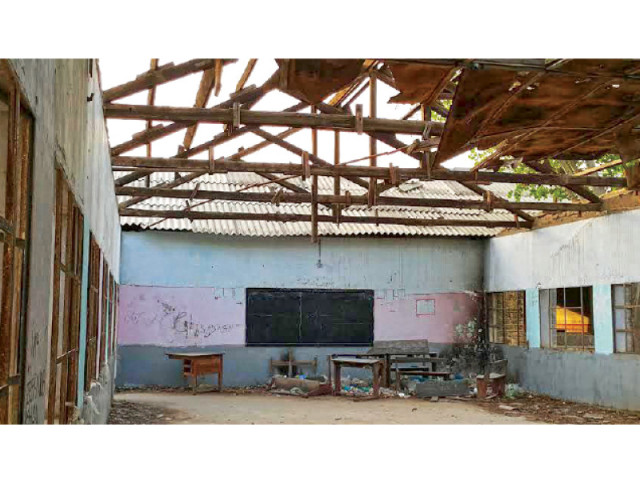Gender discrimination?: A tale of two schools
The boys school is in pristine condition but has no students

Gender discrimination?: A tale of two schools
The rooms are quite spacious, well-ventilated and inter-connected, with a door in each room leading to the adjacent one. The ceiling is made up of iron sheets, hardly supported by the shuttering with broken patches through which one can see the open sky.
Young girls dressed in the traditional blue and white qameez shalwar uniform are seated at their desks with books and copies open in front of them. A teacher sits before them with an open book on her lap. The young students huddle together on oak-coloured wooden desks, quite oblivious to the pathetic ambiance that surrounds them.
“This government school has existed ever since Pakistan came into being,” the principal, Nasira Hikmat, told The Express Tribune. “I have witnessed the sorry state of the school since I became associated with it around four years ago.” she added.

The school boasts an enrollment of 107 students. Hardly 10 students can be seen in each of the two classrooms being attended to by the teachers. “It isn’t vacation time yet,” says Hikmat. “We just finished with the mid-term exams, which is probably why the strength of students is so low.”
According to Hikmat, the students are taught English, Mathematics, Urdu, Science, Social Studies, Islamiat and Sindhi.
There are five teachers posted to the school. The district education officer for Karachi, Abdul Wahab Abbasi, admits the student-teacher ratio is a problem. “The problem with teachers is they use sources to get transferred from one school to the other,” he explained. “The records may show a designated number of teachers when the reality may be quite different.”
Electricity is a non-existent entity. There are no fans or lights in the two classrooms and the students make use of the plentiful natural light that seeps in through the cracks in the ceilings. “Basic facilities are not provided to us,” says Hikmat. “The CAA water plant gives us water from time to time. I often bring a matka of drinking water with me to school.”
The Government Girls School, despite its deplorable state, is regularly visited by parents who want to get their girls enrolled. “These are usually children of workers at the airport who have no option but to get them schooling in a government school because it’s free,” says the principal.
Why the discrimination?
Though the pitiable condition of the girls’ primary school is evident to any onlooker, the boys secondary school adjacent to it is a different story altogether. Built along the same lines as its counterpart, the boys’ school appears freshly renovated, clean and in a much better condition than the former. The walls, though otherwise spotless, have lessons scribbled on them in an organised manner, giving the impression they must at one point be used as makeshift blackboards.
Despite the better condition, however, not a single student can be found on the premises. “There are only four students enrolled in the school and none of them bother to show up,” says Raza Muhammad, the only teacher in the Government Boys Secondary School.
The grounds in both schools serve as junkyards for the broken doors, window frames and other school furniture. Dark brown wooden desks, that either have their legs or seats missing, are piled up to the roof in a room called the ‘gallery’.
“The Engineering and Works Department is responsible for the renovation and fixation of schools. In 2006, Rs40 million were allocated to the department but they were not used properly,” explains Abbasi. Since then, no funds have been allocated to them,” he said, adding that their yearly budget of Rs22,000 was meant for arranging stationery and textbooks only.
Published in The Express Tribune, December 11th, 2014.


















COMMENTS
Comments are moderated and generally will be posted if they are on-topic and not abusive.
For more information, please see our Comments FAQ